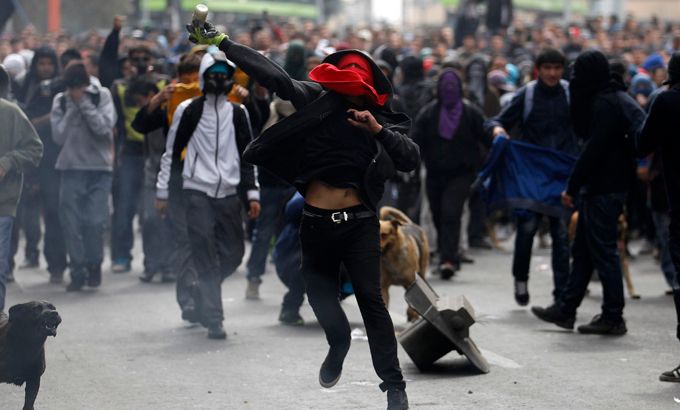Clashes as Chilean students stage protests
Tens of thousands take to the streets in one of the largest demonstrations demanding free education.

Tens of thousands of students flooded the streets of Chile on Thursday in one of the largest demonstrations demanding free education.
After two years of student marches that have paralysed Chile’s major cities and generated expectations of change to a troubled system, the crisis over education reform remains a key electoral issue ahead of November’s presidential election.
Keep reading
list of 4 itemsThirty years waiting for a house: South Africa’s ‘backyard’ dwellers
Photos: Malnutrition threatens future Afghan generations
From prisoner to president in 20 days, Senegal’s Diomaye Faye takes office
Thursday’s protests were mostly peaceful. Students waved flags, chanted slogans and danced in the streets in a festive atmosphere recalling the creative marches of 2011, when thousands dressed as superheroes, staged mass kiss-ins and danced like zombies to Michael Jackson’s “Thriller.”
But the marches, which are often infiltrated by violent anarchist groups, also ended with clashes between police and hooded vandals. Police arrested 109 people, including 24 minors, and at least six police agents were injured.
Student organisers estimated the crowd in the Chilean capital on Thursday at about 150,000 people. City officials said the number was closer to 80,000.
Local media called it one of the largest marches in Santiago in more than two decades.
‘Here to stay’
The size of the protest showed the strength of the student movement in an election year, said student leader Camila Vallejo.
“This symbolises that the student and social movement didn’t go home and that that the movement is here to stay,” Vallejo told local ADN radio.
The protests began during the 2006-2010 government of Michelle Bachelet and grew into strikes and school takeovers that forced her to shuffle her Cabinet. Bachelet tried unsuccessfully to calm the movement by naming a committee to discuss student demands.
The protests have turned into a bigger headache for president Sebastian Pinera, whose government is focusing a chunk of the 2013 budget on financing school loans at lower rates.
But students say it’s not enough because the system is still fails them with poor public schools, expensive private universities, unprepared teachers and unaffordable loans.
Chile’s higher education burden is the toughest of nearly any nation surveyed by the multi-nation Organization for Economic Co-operation and Development, or the OECD. While families in Scandinavian countries pay less than 5 percent of the costs and U.S. families pay more than 40 percent,
Chilean households must pay more than 75 percent from their own pockets. The government’s share has been enough to provide only the brightest and poorest students with scholarships and grants.
Student leaders want to change the tax system so the rich pay more. They also want the state back in control of the mostly privatised public universities to ensure quality. They say change will come when the private sector is regulated and education is no longer a for-profit business.
Bachelet, 62, returned last month to Chile following a two-year stint heading the UN women’s agency in New York. She has announced her presidential bid and says if she wins a second term in office, she will try to end for-profit education.
“I believe the education effort must be infinitely more integrating, more inclusive and take care of the quality, of the barriers that block access to financing, of the segregation,” Bachelet told the weekly newspaper The Clinic in an interview published on Thursday.